Dear Readers,
We’ve made the leap to WordPress, as you can see, and we thank you for your patience while waiting for the latest installment of Into the Wind.
This column began as a motorcycle blog, and today you’ll find a tasty motorcycle morsel inside; going forward, however, we’ll extend this space to include all forms of travel. Future stories may / may not be motorcycle specific, but they will always draw on the freedom, adventure, and spirit-filling quality of the genre.
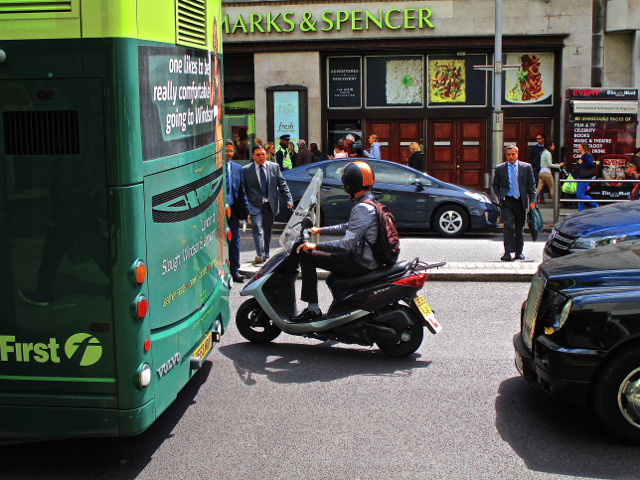
***
A conversation about travel with my Millennial son recently revealed that we, uncharacteristically, agreed on two fundamental ideas: changing localities doesn’t solve a traveller’s personal problems; however, getting out of comfort zones and witnessing the ways others live increases appreciation for the many blessings of home.
And I also think the priceless lessons of travel extend to all foreign localities, as it’s the people you meet, not the statues and landscapes photographed, who make the travails of travel worth the effort.
That said, you’ll see through this photographic journal that Cornwall, Devon, and Estonia are visual jewels, indeed. Eye candy doesn’t hurt, and therein lies a conundrum.
Does the unpaid hobo journalist take time to breathe in the scenery in order to imprint an indelible picture upon the memory bank like a double-quad-core-3d printer, or does he live the entire experience through a tiny smudged focus window?
The first option affords instant gratification and life-building memories; the latter bestows several lifetimes of re-livable events onto countless generations if they choose to copy. Believing that “the cloud” is eternal stretches the boundaries of gullibility, methinks.
The trick is to keep a balance. There is time for both. If you’re trigger happy, relax. If you’re too lazy to pull out the camera, well, good luck telling someone what the Durdle Door looks like.

***
This journey began in October, 2014. I was checking Facebook one morning and up popped an announcement that tickets were on sale for Eric Clapton’s 70th birthday concerts — four shows — at Albert Hall in mid-May. A life-long Slowhand fan, I jumped at the chance to see him at his home venue.
There was a link to Albert Hall, so I queued up and watched the tickets drain away in a matter of minutes. Dang. Suddenly, another three shows were added and I pounded the keyboard, finally breaching the digital barrier and securing two tickets for the penultimate show on Thursday May 21, 2015. Only sixty pounds each ($90). That was the inexpensive part.
But my wife Lana and I recognized a way to simultaneously paint three stripes through longstanding items on our bucket list by seeing: Cornwall, Clapton at Albert Hall, and Lana’s friend Toni, who currently lives in Estonia.
Toni and her husband Heiki (hi-key) — Texas meets Finland — have worked in the hospitality business all their adult lives (they met in Chicago when Lana and I lived there thirty years ago). Heiki is the general manager of Vihula Manor an hour east of Tallinn, Estonia, on an old sprawling estate owned by Germans pre-WWII, with an easy 2.5 mile walk to the Baltic Sea. Toni runs two businesses in Riga, Latvia via telephone and computer from their flat at the spa, but has also started working for a language school for business execs near Winchester, U.K.
***
One of our crosses to bear — love your neighbor! — we’ll call her Helga, whose main mission in life is to ask probing questions about everyone’s personal life so she can pull out any traces of turmoil — death notices tickle her into a squirm, for example — so we’re very careful about sharing information.
“Where ya’ll going this time?” she asked my wife.
“Charlotte, then towns east of there.”
“Well, don’t forget to bring me a magnet!”
A constant requirement of travel is to purchase a magnet for Helga. I’m afraid her refrigerator door will jack itself off the hinges one day from the accumulated magnet weight, spilling processed food all over a dog-hair-covered floor. Yum.
For this trip I bought her a painted magnet reading “Estonia” because I thought I might easily change it to “Gastonia” but our son capitulated and spilled the beans after a week of endless interrogation. When we arrived back home, Helga accused us of mendacity.
“I didn’t lie. We went to Charlotte and towns east of there. You need to get better at asking questions.”
***
10 May 15

We landed at eight on Sunday morning after a nasty flight, knees jammed, no sleep, stale air, plastic wrapped microwaved processed gunk offered as food, you know the drill, but London was sunny with crisp cool air and we Tubed down to Victoria Station from Heathrow, found our Indian-run rabbit warren of a hotel room, dutifully downed our first pork-sausage-greasy-egg breakfast, then began walking. Fruit and vegetables are scarce in most public restaurants owned by Brits.
The first Englishman we met, wearing a thick wool sweater and sunning on a bench in Hyde Park with his wife, was a retired chemical engineer for Kodak, a forty-year resident of Rochester, New York. My wife is a retired business manager for Kodak / Eastman, who toiled in the chemical industry until one month shy of her fortieth anniversary. Small world.
The gentleman told us that on this day soldiers would be marching, the Queen would be reviewing, and that the Red Arrows (Britain’s equivalent of our Blue Angels) would rocket overhead in celebration of Victory in Europe Day seventy years prior. We’d wondered why so many people seemed especially overdressed.

At one point I noticed what appeared to be sisters, dressed in similar light blue rain jackets, taking in the festivities. About an hour later, after we’d visited Speaker’s Corner, they happened to walk over and sit beside us on a park bench. Both were WWII brides visiting London to pay respects to the sacrifices their men and all British citizens made to ensure freedom in Europe, which put these ladies around 90, I reckon.
Turns out, they were from Dorset, and when I mentioned the fact that T.E. Lawrence (a.k.a. Lawrence of Arabia) was from Dorset and that he loved motorcycles, they lit up and told us that Lawrence was from their village Wareham, and they knew the type of motorcycle he rode, exactly where he bought the farm — Lawrence died in a motorcycle accident avoiding two bicyclists — where he was buried, and tons of details I couldn’t fully absorb after winging over the pond and traipsing a half dozen miles around London paralyzed from the face back, the American Zombie, bloated on pork sausage.
We hugged goodbye, and I said I admired them, still paying respects to their husbands’ sacrifice, and looking wonderful, so full of life. They walked away arm in arm, heading back to Dorset, their hearts full of people remembered, people now passed. These Brits are resilient, and you have to admire them for their heart and tenacity.

Although tired, we visited Wellington’s Arch and Monument at Hyde Park Circle, and Westminster Cathedral, not to be confused with Westminster Abbey, which we visited the next day in Hampshire County. Then we trudged back to our hotel and forced a couple of Guinness Extra Colds down our necks, for medicinal purposes, and tried — for the last time, a round of mashed peas and cod.
One doesn’t travel to the UK for the food, and after only one day of sausage and breaded fish, we turned to foreign fare (Indian, Ethiopian, Tapas, and Thai restaurants abound, often with better prices and always with improved cuisine) while sticking with the unimpeachable UK malted beverage. The water is good nearly everywhere on the Island, a great asset for the future.
***
10 May 15
Winchester. The Durdle Door. Lulworth. Exeter.
We’d booked a five day small bus tour through Cornwall and Devon with a company called “Rabbies”, a Scottish outfit with great ratings on The Lonely Planet. “Rabbies” is derived from Scotland’s poet laureate, Robert Burns, and although we got a lot of comments concerning Jewish teachers and frothy-mouthed canines, our five-foot-five inch eighteen-stone bald tattooed comedic Irish bus driver, Kevin, set them straight.

“Panzer division!” he’d yell at the incoming behemoth of a bus, chock full of leather-covered German holiday seekers.
One of the benefits of the small bus — this was a Mercedes holding two Canadians, two Brazilians, two Australians, four Americans, and two Dutch, plus the driver — was maneuverability.
We could venture down country lanes the Panzer Division could only dream about. Kevin leveraged this advantage the whole week, so we got to see the crown jewels of the region without swarms of tourists clogging the view. Early May is a good time to travel in Europe as the foreign hordes have not yet descended, the English gardens are reaching full tilt, and children are still in school, though out on field trips by the droves.
Our first destination after escaping the swarms of London for the stunning Southeast countryside was Winchester, the county seat of Hampshire County, which resonated with me, after growing up on a hog farm in western Illinois carrying five gallon buckets of corn to three hundred Yorkshires and Hampshires. Furthermore, my dad would invariably wait until these beasts reached fifty pounds or more before we “cut” them, so the “Rocky Mountain Oysters” would be large enough to satisfy all the factory workers he befriended working a second job over the winter. Once a flailing Hampshire barks its death scream into your ear as you pin it to the ground while you’re dad removes its gonads with an rusty razor blade, well, let me just say the shriek lives on.
Winchester is a remarkable city with splendid Medieval architecture throughout; it was the first capital of England, and supposedly the site of Camelot.
But there are at least four supposed sites for Camelot and we’d visit two on this journey (Winchester and Tintagel). The Great Hall near the city’s center features “the round table” and a Medieval garden. A statue of Alfred the Great greats you at the entrance to the main thoroughfare. He’s the guy who eventually kicked Viking arse big time.
Bus driver Kevin said the Vikings never went deep into Cornwall — and the Romans stopped at Exeter for the same reason — because the Cornish were insane fighters. This legend may have appealed to his Celtic blood, but the locals say the evidence is in the fact that no natives look Nordic. If this sort of thing interests you, I suggest the slim volume “England” by Nikos Kazantzakis, the guy who brought us Zorba the Greek and The Fratricides. He clearly describes the various invasions of England, and why people in certain regions look the way they do, from Viking blonde locks to Roman aquiline noses.
Having read many of the King Arthur stories (nothing touches The Once and Future King, but La Morte D’Arthur is essential if you’re interested in the topic), the idea of searching for Camelot was fetching, though we never set out to look for it in the first place.
Perhaps this is the concept behind The Wizard of Oz: Travel may be exciting, eye-opening, and soul-searching, but it never leads to Camelot; instead, it simply reminds you that you left Camelot behind thousands of dollars ago and it’ll be good to get back to it one day, complete with its comfortable Camelot bed.
Following a hearty lunch of lamb stew and Strength, we motored down to the Durdle Door, a limestone arch jutting out to sea; to get there, we followed a steep descent down through the mist to the sun-streaked beach. By the looks of the unrelenting and rising sea, the Durdle Door won’t last through this century, so it was a reminder of our fleeting tenure here on the warming greenhouse gassed Mother Earth.
Then we motored over to a near-secret jewel in the Cornish crown, Lulworth, where fat-bearing ice cream shops lured in dozens of cone lickers and signs explained the meaning of The Jurassic Coast, an advertising gimmick featuring the many fossils found on the beaches in a way that supposedly connects to the Michael Crichton thrillers. Not.
Lulworth homes feature unique thatched roofs; artisans leave their signatures via a weaved squirrel, fox, fish … whatever the creator’s calling card may be.
Heading to Exeter, we cruised down lanes shouldered by endless hedgerows and rock walls, each field enclosed for sheep or dairy, an endless heart-bending landscape, what I dreamed of seeing, only better, due to the shared experience and the exaggerated smells and the focus of knowing I’ll only see it again on a little screen, through the mind of Jane Austen, or in my hole-strewn cheesecake memory.
Dragging our luggage up four flights of stairs at The Bendene, just down the street from Exeter’s Clock Tower, revealed a wonderful room with a double window opening upon the back of Exeter College with its unique architecture and percolating student body thrashing all over town most hours of the day, spending pounds and keeping the town in spit-shine economic condition. Kevin recommended a local eatery, The Imperial, which is part of a chain across the UK offering filling low-cost pub meals and the lowest beer prices we’d see on the trip.
12 May 15
Launceston Castle, Dartmoor National Park, Tavistock, Buckfast Abbey
Tuesday morning we headed to Dartmoor National Park after stopping at Launceston Castle, built in the 13th Century right after the Norman Conquest and imprisoning George Fox, founder of the Quakers.
Kevin, a fearless driver and non-stop jokester, blasted up the narrow lanes climbing to the balds of Dartmoor where through the climb lush farm ground suddenly turned to rock and broom sage and we saw dozens of ponies grazing and gaggles of tourists bending into the cold wind from the higher altitude (2k feet) and near proximity to the ocean.
Lana and I took up the last two seats in the back of the bus, reliving our grade-school days, and sitting behind Mr. and Mrs. Muggies from Ontario, way north of Toronto.
When I asked Mrs. Muggies her given name, she said: “Marilyn.”
“That’ll be easy to remember,” I replied. “Marilyn is the name of my kindergarten teacher, and she was a jewel.”
“I’m a kindergarten teacher as well!” she giggled.
Then Mr. Muggies turned in his seat, presented his plaintive deadpan Buster Keaton face, and said: “Then she’d come home every night and take it out on me.”
It turned out that Mrs. Muggies’ people were from a small farming hamlet inside the park and Kevin found the home place and nearby tavern her ancestors actually owned back in the day. Of course she was thrilled and jumped about the empty seats snapping pictures.

After stopping near two bridges — one eight hundred years old, the other merely three hundred — we walked among new spring flowers beside an ancient brook and imagined skeleton bone ancestors reborn and walking these same steps through the span of fog-laden history.
Mrs. Muggies’ ancestors must have been a hearty lot, pumping full days of energy into a spring sheep shearing followed by a back-breaking short growing season, then holing up after the toil of harvest and slugging down barley water throughout an interminable rain-soaked winter. I reckon that’s where the tavern comes in.
Much more money is to be had in pints and shepherd’s pie than in subsistence labor. No wonder people risked the two-month small boat hard cider dry biscuit puke fest through roiling water toward the New World promise of better land, and temperate climates.
Pulling out of the west side of the park, we motored into Tavistock, a marketplace founded in A.D. 961 and the home of Sir Francis Drake. After shunning the touristy trinkets, we walked beside the River Tavy and admired the new plants blooming out of the ancient limestone wall lining the walkway. Rounding a corner, we came upon an athletic center and spotted these women in the back of the pool chatting up what’s for lunch instead of pumping the appendages.
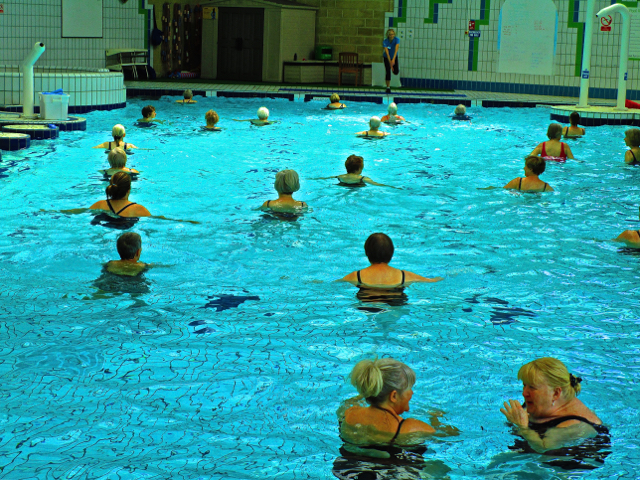
Our final stop of the day put us at Buckfast Abbey, the only abbey to be rebuilt after the Protestant Reformation when mean old King Henry the Eighth couldn’t win a divorce from Catherine of Aragon due to Catholic dogma and a pope he didn’t like, so he started his own state religion (based on Catholicism), pronounced himself Supreme Head of the Church of England, and began tearing down all the Catholic monasteries.
This is why we have separation of church and state built into the establishment clause of the US Constitution:
Congress shall make no law respecting an establishment of religion,
or prohibiting the free exercise thereof….
When I see Americans appearing in photographs sporting a Bible in one hand, an automatic weapon in the other, the American flag flowing in the background, it makes me wonder whatever happened to the teaching of history, government, and civics? Who did away with that? And why?

I somehow missed that course of events, just like I never knew that banks were handing out billions of dollars in bad loans to jobless grifters while simultaneously bundling these bad mortgages into “derivatives” then re-selling them on the stock market. That one got by us all, cost us all an arm and a leg, sometimes literally if we had to choose the military over unemployment in order to keep our children fed.
ISIS is as close as Nashville or Washington when we blunder down the same path repeatedly, putting our lives in the hands of good-old-boy religious extremists — no different than bearded jihadists — expecting a different result. When only immigrants understand the inter-workings of the three branches of US government because they’re required to in order to become US citizens, they will soon vote in overwhelming numbers and leverage their knowledge to their advantage. Good for them. If we don’t want to educate our own children, to take them outside of the county every now and then to see how other people live, to expect them to read and explore and sweat and enjoy nature and understand how the government works, and perhaps think a little, well. We’ll get just what we deserve. There’s always a Henry VIII, Napoleon, Hitler, or Kim Jong-il ready to take advantage of the situation. Read James Clavell’s The Children’s Story if you want to see how it will happen.
I believe we need to wake up long enough to revive the comprehensive teaching of history, government, and civics; and also to require each citizen between the ages of eighteen and twenty-five to serve two years in some kind of service such as: a) one of the three branches of the military; b) the Peace Corps; c) VISTA; d) the National Guard; or, e) a revived Civilian Conservation Corps.
The volunteer may choose their branch of service and will be paid for time served in either cash or tuition and fees to a college of their choice. Crumbling infrastructure including highways, interstates, bridges, national parks, schools, public hospitals, and public green spaces will take first priority in the reclamation project spanning from sea to shining sea. The savings will come from starting now, rather than later.
If we can get the kids away from small screen electronic devices long enough to understand the basic principles inherent in a well-rounded, well-fed, well-exercised, enlightened life, get them outside with their hands on real objects solving real problems, then we will survive as a nation well into next century, given accelerating climate change doesn’t swamp us out or burn us down.
These young adults can go right back to the basement and thumb game console buttons or return to the malls fingering cell phones and munching caramel corn as soon as their service is up. But somehow, I think a change would take place. Priorities would be different after they looked back and saw what they’d accomplished. The need to throw rocks at uniformed policemen would expire. Civic pride in the rebirth of America would replace the ubiquitous meth lab fire on the daily news. End of speech.
(I wish. The same day I wrote this piece the back of our house was nearly taken out by a thirty-year old multiple motor vehicle offender ticketed with drag racing; he wiped out two trees, a utility pole, and our fence, leaving shrapnel in the form of boards, nails, and car parts all over the patio, even denting the house and leaving boards on the roof. His opponent, a seventeen-years-old, ferrying a carload of other seventeen-year-olds, took out the utility pole across the street. Both cars were totalled; neither driver owned the car they were racing. No one was hurt! We usually sit out on the patio on Friday nights, and would have absorbed the shrapnel. Our youth need something to do with their lives, something that will lift themselves, and therefore lift the country, simultaneously.)
***
Buckfast Abbey, as previously mentioned, is the only abbey to be rebuilt after the Protestant Reformation.
The architecture and woodwork are stunning, the story of its rebirth a must-read, and another amazing aspect is the rubble from the Henry VIII era was purchased by a local mill owner and used to build a manor house right beside the abbey. As a final treat, there was a photographic exhibition and competition at the manor house, and the entries were all professional level and unique. Local arts thrive due to agreed-upon almost inherent need to communally share beauty and expression and to discuss higher issues. There are pockets of this sentiment to be found around the US — the Northeast and Northwest come to mind — but we don’t enjoy a unified national passion for the arts like what’s experienced throughout the U.K.
After arriving back in Exeter, we photographed the city’s cathedral and then meandered down picturesque cobble stone side streets leading us to an ancient Catholic church where a choir practiced, filling the live stone room with bright warm sound. Such are the small jewels of travel.
13 May 15
The endless tall hedgerows and stone fences of rural Devon were a delight, but nothing touched my soul the entire trip like the view of the Atlantic from Boscastle, a unique fishing village on the north coast of Cornwall. Tears appeared and ran down my cheeks, unforced. There’s a powerful aura of history pulsing here; the only other times I felt similar stirrings was at Appomattox Courthouse, Virginia, and a first visit to the Vietnam Wall. Unless you’ve picked up on such a vibe, say at Angkor Wat or Machu Picchu … it’s impossible to describe. Had I been the only one to experience this, I wouldn’t mention it.
But Kevin said he had a particular difficult customer one spring, an uptight executive who couldn’t be pleased, the Scottish Highlands weren’t high enough, the Loch Ness Monster didn’t spring out of the depths for him, Ireland wasn’t quite as green as it could be, you know the type.
But Boscastle knocked him out. He experienced muteness for the first time in his life after standing on the apex of the western promontory overlooking the sea.
Boscastle was nearly destroyed during a flash flood in 2004, but all the Queen’s men put Boscastle back together again. They had to. Not only the economic incentive drove them; the spirit of the place required it.
***
Just down the road from Boscastle lay another Camelot, or at least another supposed birthplace of King Arthur, at Tintagel. The Panzer Division and other land yachts couldn’t navigate the tiny lanes of Boscastle, but they were lined up en masse at Tintagel, and the castle remains were strewn with human and animal sheep from all over Europe. Yet, the view took all that away.
There’s even a “Merlin’s Cave” here that reveals itself during low tide and can be visited by footpath.
As it turns out, a good friend of ours is a military brat who’s American soldier dad met her British mom in the U.K. post WWII, lived at the military base near Tintagel for a time, and played on these beaches as a child. The family later transferred back to the States and ended up in East Tennessee. We had no idea she’d breathed in such beauty at a tender age; now we know her Anglophile personality is a mixture of nature and nurture.
At the end of the day we drove into Falmouth, exited the bus at our delightful B&B just above the bay, and after a short rest walked the main thoroughfare full of restaurants and as many university students as we saw in Exeter. Not starving, we chose a comfortable Tapas bar and savored three appetizers before hiking back and sleeping like Cornish warriors.
14 May 15
Minack Theatre, Lands End, St. Ives, Falmouth
Our final day touring Cornwall began with a few pictures snapped from the beach in front of St. Michael’s Mount. Kevin gave us a choice; St. Michael’s Mount, which would take most of the morning to hike in during low tide and then race back, or the Minack Theatre.
Both Winchester Abbey and Cathedral were beyond amazing in size, scope, and history, but Minack Theatre won our collective hearts.
This open-air theatre was the life’s work of Rowena Cade, a local girl raised in the mansion next door, a rich heiress that nonetheless spent her life hauling sand off the beach in order to mix Portland cement while carving out an impressive architectural masterpiece from the stone cliffs overlooking the sea … and turning it all into a world-renown theatre. Once again, words fail to describe it and photographs don’t do it justice. To see it in full spring bloom was special.
The next stop was Lands End, which we knew was a tourist trap, a sort of half-baked Gatlinburg facing the Isles of Scilly, but having recently read George Mahood’s A Free Country: A Penniless Adventure the Length of Britain and knowing that this was the start of their adventure and the scene of much Brit Lit, I actually looked forward to it.
The blustery wind, hot dog and donut carts dulled the moment, but I got the sense that 847 miles by road from Lands End to John O’Groats, the highest point of the U.K. in northeast Scotland, afforded quite a journey. The characters Mahood meets along the way leave you laughing your guts loose.
St. Ive’s is a sunlit fishing village on a quaint bay that the Brits visit for the calm beaches, pubs, fishing, and generally laid-back atmosphere. We fell into pace with all the other gawkers and cone lickers stumbling down the cobble stones; then we found an ancient pub with a fun bartender and a wonderful lunch of soup and local ale. It’s difficult to mess up soup. Walking back to the city bus point, we watched the happy families blanketed on the playa, enjoying wave tag and giggling. How many times has this scene repeated itself across this island nation, beach encircling all?
Back in Falmouth — the third deepest port in the world, behind Sidney Harbor and Rio de Janeiro — we walked back to the wharf area and ate at Rick Stein’s, enjoying local sea bass for a reasonable price. Seeing one cooked whole for the first time, it reminded me of a catfish and certainly not a bass. This confirmed my suspicions that although the sea bass is sweet and tasty, a catfish is in close proximity in size and taste, and you can eat a dozen catfish for the price of one biscuit-sized filet of South American sea bass.
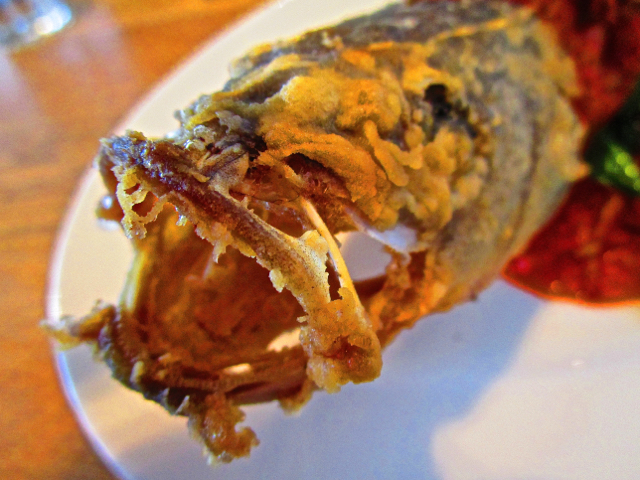
15 May 15
Glastonbury, Stonehenge, London
Our last day on the Rabbies tour bus consisted mostly of staying alive and upright while swiftly blasting down the motorway back to London, with a stop at Glastonbury, site of the annual rock concert and home to hordes of severely-aging hippies still puffing away on the wacky-toe-backy and posing for pictures with both middle fingers extended while you’re focusing the shot. Smiling back at you in youthful mirth.
Then Stonehenge. Perhaps an attempt by early sun worshippers to celebrate the solstice? Who knows. But the engineering feat and pervading mystery draw thousands into its greedy grasp each year. Thank you Druids for enriching the British Heritage Foundation. Personally, I can’t think of the place without chuckling about the infamous scene in Spinal Tap.

After reaching Victoria Station and hugging our travel mates goodbye –such a good group, all compatible — we dragged our luggage back to our second-such Indian-run rabbit warren next to Victoria Station, which was blessed with great restaurants nearby, but sported a plastic-sheeted bed, a shower that only offered scalding water, and a broken thermometer that kept the small airless room at Bombay humidity and equator temperature the entire sleepless thrashing night.
Luckily, the sun pops up early at this latitude, and we got up, splashed water on us from the sink, dried off, tossed on our clothes, dragged our bags up the street, jumped the train to Gatwick and met Toni, who was on the same after leaving her job interview in Winchester, and we flew off to Estonia to renew our kinship and enjoy some needed R&R.
16-19 May 15
The timing for R&R was perfect as we were wiped out from the tour through Cornwall, Devon, plus the London pace, which was invariably wide open. The Vihula Spa and Country Club, an hour-and-a-half drive from Tallinn, offered some much-needed rest and a chance to catch up with old friends.

The first night, however, we stayed near the Old City section of Tallinn, in a wonderful old refurbished hotel, and walked down to a medieval restaurant to enjoy a hearty meal sans utensils. Hearty soup in a long-handled bowl, a spicy mead in a thick tankard, chunks of black bread lathered with real butter. Aye.
The next morning we walked the Old Town, learned the history of Tallinn by perambulating inside the wall, reading markers, seeing the ancient merchant stalls, and photographing the amazing architecture.
At lunch we chatted up a twenty-something bartender wearing a Jack Daniels tee shirt. Learning we were from Tennessee, he professed a love for the American South, especially New Orleans, and reminiscing lead to an impromptu dance routine and an inspired monologue about brass-driven street jazz. Then a coed from Belmont University walked up and pointed to a bus load of her choir-mates on tour from Nashville. Sweet kids. Small world.
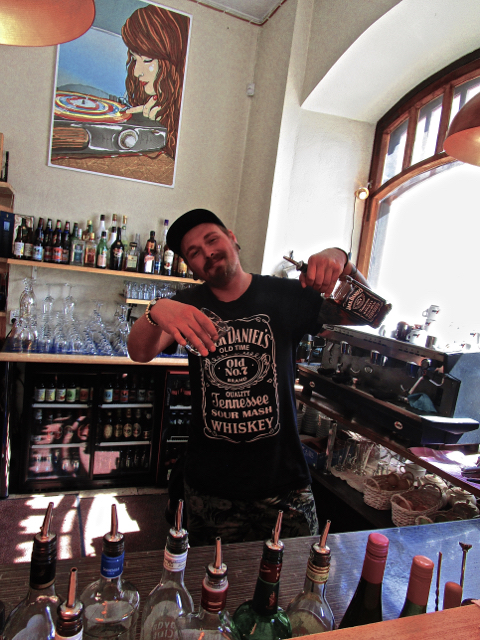
Heiki arrived in the late afternoon following a golf outing in Helsinki and drove us out to the spa, where we dined like royalty, walked the well-groomed grounds, said goodnight, then headed to bed to enjoy the large room, a sauna, and computer for uploading photos.
Over the course of the next three days we swam, soaked in the steam bath, walked down to the Baltic sea and watched swans fishing the shallows, visited Rakvere Castle, learned of the many invasions and intrigues shaping the psyche of the Estonian people, and enjoyed long dinners with Toni and Heike, sharing our concerns about our children — Millennials struggling to make a living — and what the future may hold for all of us.
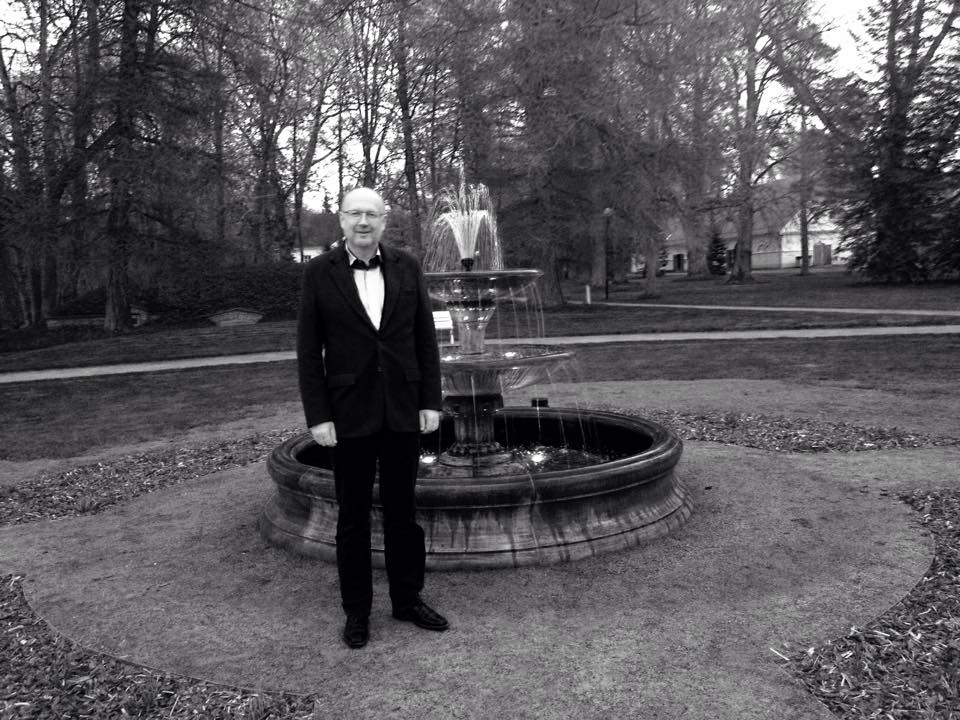
20-22 May
Finding ourselves outside of Victoria Station during rush hour, we chose to taxi to our hotel on the West End, a great improvement over the curry-infused rabbit warrens near Victoria Station (you pay for location and convenience in these big European cities, just like in New York).
The next morning we enjoyed a leisurely breakfast, then a walk down Kensington Road to check our path to Albert Hall, a mile from our hotel, where we took pictures of the Albert Memorial and enjoyed watching the dozens of nannies trundling their charges through the park. No wonder these upper crust kids are natural polyglots. They have to speak eight hours of “foreign” language before their folks even get home for supper.
Back to Albert Hall near show time, we visited a bowling green and English garden across the street before entering and circling the lower levels, looking at famous rock and roll pictures (B.B. King, Dylan, Van Morrison, Pete Townsend, ad infinitum) taken in the 60’s-70’s and on sale for big bucks, usually over 1,000 pounds each. I felt ripped off buying a 25 pound tee-shirt, something I never do, but made an exception in this case. I don’t mind helping a capitalistic grabber if he’s worked like a dog over 50 years to bring us wonderful music.
People don’t understand the work ethic inside a musician of this level. How can someone 70 years old stand and play his guts out for three hours and not break at the task? In Clapton’s case, as a young man in his early twenties (kicked out of art school for bad grades), he worked with his grandfather, a plasterer. After a few years of showing up early and working late, busting tail for the blue collar quid, the work ethic and personal pride soaked into his blood. Younger sidemen are astounded at his ability to stand and play and sing at such a high level for hours on end. But like those war brides in Hyde Park, his soul is infused with the post-war British work ethic.
And B.B. King? Picking cotton on a small farm primed him for a lifetime of achievement, and he played upwards of 240 shows a year for decades despite diabetes and other ailments. Flew his own plane to the gigs until he tuned 70. Like Clapton, he never knew his father, and barely knew his mother. A brotherhood of musicians became their immediate family, and a lifetime of effort made them a household name throughout the Western world, and half of the Orient.
One of the thrills of my life was to witness Segovia taking the stage at Chicago’s Symphony Hall in the spring of ’86, at the age of 93. It seemed like it took him ten minutes to cross the stage and sit down — even with the aid of a valet — but when he picked up his instrument and began to play …. Well. My eyes mist up at the thought. The effect on the senses was like a super-sized tranquilizer washing out every bit of tension while brightening your brain, not dulling it. To hear such a master at the height of his glory and in his tenth decade was sublime.
And here we were inside Albert Hall, looking down on the stage from the third tier circle, witnessing a man pour his heart out to his beloved home audience, appreciating them as much as they adored him, the love fest between audience and musician gaining momentum over the course of three hours and climaxing in hugs and tears all around, audience rushing the stage, a heart-felt spectacle of talent and perseverance we’ll never forget.
On our final day, knowing our energy tanks were depleted, we bought bus tickets (only five pounds each for all day) and toured various parts of the city, including Trafalgar Square, The Tower of London, the tourist-choked promenade in front of the Ferris Wheel, Parliament, and Big Ben. School children packed every venue, the pubs were packed with white-collar-beer-swillers on this Friday afternoon (just like Chicago and New York). We found ourselves out of juice by five o’clock, ready to head back and pack for the home flight.
Our U.K. jaunt at an end, we looked back in amazement at all we’d seen and done in a mere two weeks Into the Wind.
Awaking from the dream a day later, lying in our own bed inside our personal Camelot, the realization that hit Dorothy whacked us in the head as well.
Ain’t no place like the crib.
Which makes the expense, hassle, and physical drain of seeing new parts of the world worth the effort.
Because anyone who doesn’t appreciate what they already have will never find Camelot, anyway.



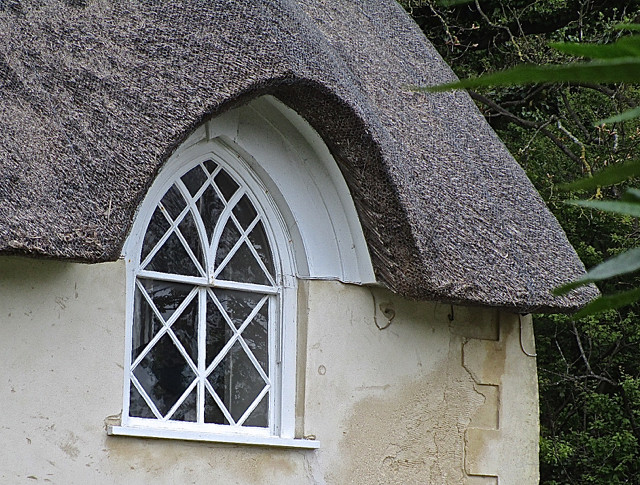
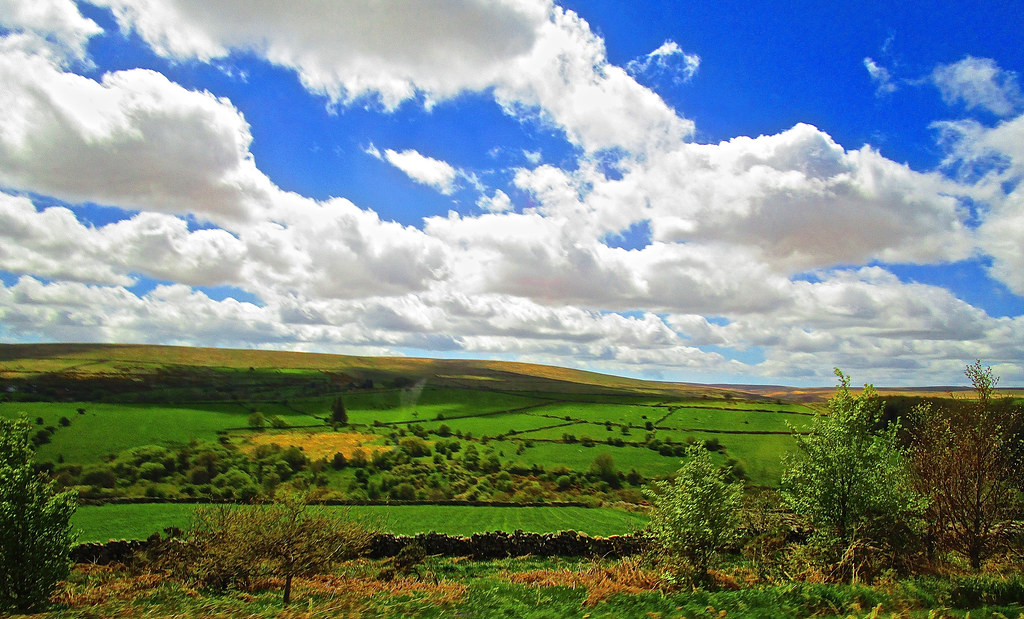

Love it! And you are right, “Ain’t no place like the crib.”
LikeLiked by 1 person
Great pics! Wow! What a trip. Now I’m going back to read it word for word.
Brian
LikeLiked by 1 person
Absolutely beautiful photography and words to go with them. The trip sounds amazing!
LikeLiked by 1 person
Hello Mike & Lana, What wonderful adventures you had! Thanks for sharing! Mary Ellis
LikeLiked by 1 person
Beautiful photos, insightful and thought provoking commentary. What a wonderful journey. Now I know why our power was off for hours! Thankful you were “across the pond” when the delinquents were on the highway. Please, never stop writing!
LikeLiked by 1 person
Thanks for sharing! Sounds like a great trip. Miss you guys.
LikeLiked by 1 person
Nice, thank you! I had the opportunity to live in Ireland for the better part of the year after college. I hitch hiked Everywhere with a ‘Home to Mum’ sign that I pulled out of my back pack. That part of the world can be way more interesting because of the PEOPLE! So very nice.
LikeLiked by 1 person